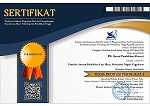The role of perceived social support on social skills of student with special needs
Downloads
Downloads
Astarini, D., Nirwana, H., & Ahmad, R. (2016). Hubungan antara Konsep Diri Sosial, Persepsi Siswa tentang Dukungan Sosial Orangtua, dan Teman Sebaya dengan Komunikasi Interpersonal Siswa dan Implikasinya terhadap Pelayanan Bimbingan dan Konseli. Konselor, 5(4), 247. https://doi.org/10.24036/02016546558-0-00
Bennett, K. S., & Hay, D. A. (2007). The role of family in the development of social skills in children with physical disabilities. International Journal of Disability, Development and Education, 54(4), 381–397. https://doi.org/10.1080/10349120701654555
Cole, D. A., Nick, E. A., Zelkowitz, R. L., Roeder, K. M., & Spinelli, T. (2017). Online social support for young people: Does it recapitulate in-person social support; can it help? Computers in Human Behavior, 68, 456–464. https://doi.org/10.1016/j.chb.2016.11.058
Getzel, E. E., & Thoma, C. A. (2008). Experiences of College Students With Disabilities and the Importance of Self-Determination in Higher Education Settings. Career Development for Exceptional Individuals, 31(2), 77–84. https://doi.org/10.1177/0885728808317658
Hayati, L. (2014). Menonton Televisi Dan Bermain Video Games Sebagai Faktor Risiko Ganggguan Pemusatan Perhatian / Hiperaktivitas Pada Anak. Universitas Gadjah Mada, Yogyakarta.
Lane, K. L., Carter, E. W., Pierson, M. P., & Glaeser, B. C. (2006). Academic, social, and behavioral characteristics of high school students with emotional disturbances or learning disabilities. Journal of Emotional and Behavioral Disorders, 14(2), 108–117.
Lee, C.-Y. S., & Goldstein, S. E. (2016). Loneliness, Stress, and Social Support in Young Adulthood: Does the Source of Support Matter? Journal of Youth and Adolescence, 45(3), 568–580. https://doi.org/10.1007/s10964-015-0395-9
Lutfi, D. N. (2012). Hubungan antara dukungan teman sebaya dengan kemampuan pemecahan masalah pada santriwati pengurus organisasi pelajar ppmi assalaam. (Doctoral dissertation). Universitas Muhammadiyah Surakarta.
Macintosh, K., & Dissanayake, C. (2006). Social skills and problem behaviours in school aged children with high-functioning autism and Asperger's disorder. Journal of Autism and Developmental Disorders, 36(8), 1065–1076. https://doi.org/10.1007/s10803-006-0139-5
Mangunsong, F. (2009). Psikologi dan Pendidikan Anak Berkebutuhan Khusus, Jilid Kesatu. LPSP3 UI.
Mangunsong, F. M., & Wahyuni, C. (2018). Keterlibatan Orang Tua terhadap Keterampilan Sosial Siswa Berkebutuhan Khusus di Sekolah Dasar Inklusif. Jurnal Psikologi, 45(3), 167. https://doi.org/10.22146/jpsi.32341
McDonnall, M. C., Cavenaugh, B. S., & Giesen, M. J. (2012). The relationship between parental involvement and mathematics achievement for students with visual impairments. Journal of Special Education, 45(4), 204–215.
Mclntyre, L. L., & Phaneuf, L. K. (2008). A three-tier model of parent education in early childhood. Topics in Early Childhood Special Education, 27(4), 214–222. https://doi.org/10.1177/0271121407311239
Michelson, L., Sugai, D. P., Wood, R. P., & Kazdin, A. E. (1983). Social Skills Assessment and Training with Children. Springer Science + Business Media. https://doi.org/10.1017/CBO9781107415324.004
Nugraini, I., & Ramdhani, N. (2017). Keterampilan Sosial Menjaga Kesejahteraan Psikologis Pengguna Internet. Jurnal Psikologi, 43(3), 183. https://doi.org/10.22146/jpsi.22139
Ramdhani, N., & Martaniah, S. M. (1995). Pelatihan keterampilan sosial pada mahasiswa yang sulit bergaul= Social skills training on shy-socially isolated students. Berkala Penelitian Pasca Sarjana, 8(1995).
Rejeki, K. (2016). Strategi koping adaptif sebagai mediator hubungan antara persepsi dukungan sosial teman sebaya terhadap penyesuaian psikososial remaja saudara kandung penyandang disabilitas intelektual. (Thesis, tidak dipublikasikan). Fakultas Psikologi, Universitas Gadjah Mada.
Riley, A., Anderson-Butcher, D., Logan, J., Newman, T. J., & Davis, J. (2017). Staff practices and social skill outcomes in a sport-based youth Program. Journal of Applied Sport Psychology, 29(1), 59–74. https://doi.org/https://doi.org/10.1080/10413200.2016.1179700
Sarafino, E. P., & Smith, T. W. (2011). Health psychology: Biopsychosocial interaction (7th ed.). John Wiley & Sons, Inc.
Shaffer, D. R. (2009). Social and personality development (6th ed.). Wadsworth, Cengage Learning.
Sullivan, L., Ding, K., Tattersall, H., & Yang, J. (2020). Source of social support and post-injury depression and anxiety among college student-athletes.
Sutoyo, L. P. R., & Hendriani, W. (2018). Peran Dukungan Keluarga dan Konsep Diri Terhadap Peningkatan Keterampilan Sosial Anak Tunarungu di Sekolah Inklusif. PHILANTHROPY: Journal of Psychology, 2(1), 37. https://doi.org/10.26623/philanthropy.v2i1.1139















